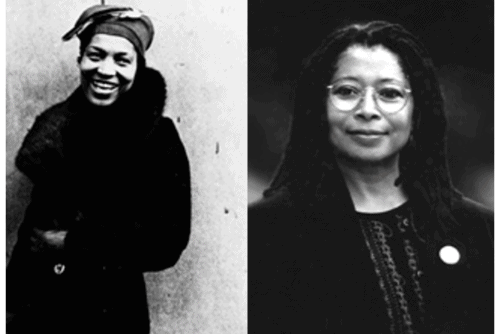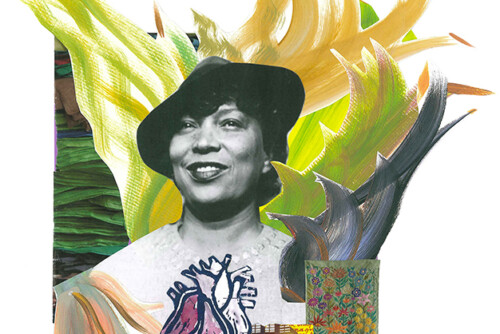And during that period, in the ’40s and ’50s, she was hoping to write without having to bother about white audiences. She began a novel called The Golden Bench of God, and imagine if we had this now; it was a novel about black hairdressing entrepreneur and art patron Madame C. J. Walker. Imagine that novel . . . which is lost.
She wrote to her literary agent: “Imagine that no white audience is present to hear what is said.”
Her publisher rejected it. Waterbury was unable to place it, and the novel is missing. She needed that audaciousness to get through the various political struggles in which she was engaged. And to hold on to her own committed vision. The last letter that I want to share with you is a letter that she wrote to W. E. B. DuBois in 1945.
This letter is audacious in many ways, which you will see in a minute. But one of the things that makes this letter so particularly audacious is that they hadn’t spoken in over 20 years. During the 1920s, they were friends. Although, as always, she was critical of his leadership. She was critical of everybody’s leadership. But she gave him a nickname—Dr. Dubious. She actually put it in print at one point. And they had had quite a falling out. Yet 20 years later, when she had an idea that she thought was worth pursuing, this is the letter that she wrote DuBois. And compare this to the letter to the dean of Morgan College, back in 1917. That audaciousness, I think, is getting her through. It’s allowing her to stay committed to her vision of race, at a point at which she is subject to so many critiques by so many people, when they will even publish her work.
My Dear Dr. DuBois:
As Dean of American Negro Artists, I think it is about time that you take steps towards an important project which you have neglected up to this time.
Why do you not propose a cemetary for the illustrious Negro dead? Something like Pere la Chaise in Paris. If you like the idea, may I make a few suggestions to you?
1. That you secure about one hundred acres for the site in Florida. I am not saying this because it is my birth state, but because it lends itself to decoration easier than any other part of the United States. I think that was why Edward S. Bok chose Florida for the world famous Bok Tower. I hope that you have seen it, for it is a thing of wondrous beauty. And the thing I want you to note is that two-thirds of the beauty is not in the Tower itself, but in the surroundings. You see, Dr. DuBois, the very woods of Florida afford trees and shrubs free that would cost a fortune north of here, even provided they could be made to grow. Magnolias, bays, oaks, palms, pines, all free for the taking. Beautiful shrubs, while not wild, so plentiful that you could get thousands of cuttings of hibiscus, crotons, oleanders and the like, for the mere asking. And dont forget the beautiful disease and insect repelling camphor tree which grows here so free and quickly. By the time that each wellknown Negro contr[i]buted a tree or two, you would have a place of ravishing beauty. Ceremonies of tree-setting, of course. You would, like Bok, select a site in the lake county of Florida, where thousands of acres are available and as cheap as five to ten dollars an acre on lakes.
2. That there be no regular chapel, unless a tremendous amount of money be secured. Let there be a hall of meeting, and let the Negro sculptors and painters decorate it with scenes from our own literature and life. Mythology and all. Funerals can be held from there as well.
Addition to first suggestion: In Florida, the vegetation would be green the year round, so that visitors during the winter months would not see a desolate looking place. For you must know, that the place would attract visitors from all over the world.
3. As far as this is possible, remove the bones of our dead celebrities to this spot.
4. Let no Negro celebrity, no matter what financial condition they might be in at death, lie in inconspicuous forgetfulness. We must assume the responsibility of their graves being known and honored. You must see what a rallying spot that would be for all that we want to accomplish and do. There one ought also to see the tomb of Nat Turner. Naturally, his bones have long since gone to dust, but that should not prevent his tomb being among us. Fred Douglas, and all the rest.
You will naturally ask me why I do not approach Mary McLeod Bethune, since she is right here in town with me. But my objection is that she has never uttered nor written a quotable line, never created any art form, nor even originated an educational idea. She has not even improved on any that have been originated. So I think that she should come into the thing later on. In fact, having made the suggestion to you, I shall do nothing more if you like the idea and take it up. I mean nothing that is not asked of me. I am no organizer, and I know it. That is why I have never accepted any political appointment, though three have been offered to me since the War began. I like to sit and meditate and go my own way without strings, so that I can say what I want to. That is precious little at present, because the publishers seem frightened, and cut everything that seems strong. I have come to the conclusion that for the most part, there is an agreement among them to clamp on the lid. But I promise you, that if you like the idea and go ahead, I will fall in behind you and do all that I can.
I feel strongly that the thing should be done. I think that the lack of such a tangible thing allows our people to forget, and their spirits evaporate. But I shall not mention the matter to anyone else until you accept or refuse. If you accept, there is no need for me to say anything more because that will be your province. If you refuse, then maybe Walter White and the N.A.A.C.P. might take it up.
Oh, yes, the reason that I suggested so much as 100 acres was because it would prevent white encroachment, and besides, it would afford space for an artist colony if ever the need arose. You can call on me for the first contribution. If you came down to look over sites, I could save you a lot of trouble by driving you around to look, since I know the State pretty well. I think that I know where to get some mahogany from Central America for the inside woodwork of the building.
Your own mind can furnish you plenty of details, so there is nothing more for me to say except congratulations on your stand at San Francisco, and many good wishes for the future.
Sincerely,
Zora Neale Hurston.
His reply was a very terse, one-sentence note in which he thanked her very much for her idea, but that the press of other work and obligations would unfortunately keep him from responding.



